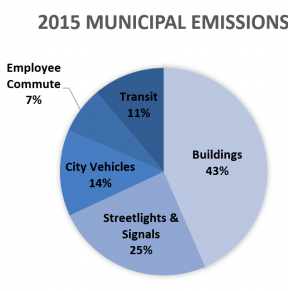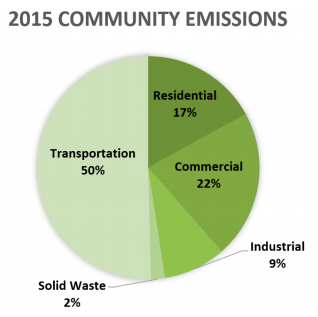US cities are taking action to address the climate crisis. Knoxville, Tennessee recently unveiled goals to cut greenhouse gas emissions (GHG). Here we review those goals, how they could affect the Scruffy City, and where neighboring cities stand. Laura Humphrey, former Energy Policy Associate at the Southern Alliance for Clean Energy also contributed to this blog.
Maggie Shober | June 13, 2019 | Climate Change, Energy Policy, TennesseeWhat are Knoxville’s emission reduction goals?

- Existing goal: cut community-wide emissions 20% from 2005 levels by 2020.
- Proposed goals: cut city government emissions 50% from 2005 levels by 2030, and community-wide emissions 80% by 2050.
[Note: moving forward, all goals will refer to a 2005 baseline unless otherwise indicated]
City Council is expected to vote on the proposed goals in July. Knoxville decision makers have described the proposed goals as “ambitious and achievable,” and hope the next mayoral administration will take the step to put pen to paper and implement a plan to meet the proposed emissions goals.
Erin Gill, Knoxville’s Director of Sustainability and key architect of the goals, said the following.
“The challenge of climate change calls for bold leadership from multiple sectors and many types of institutions. City government can and should lead by example – and the City’s goal for 2030 challenges us to pursue continued, meaningful reductions in our municipal footprint. At the same time, the community goal for 2050 calls on the City to champion partnerships and community-driven solutions that achieve deep carbon reductions while creating inclusive economic opportunity and an improved, more equitable quality of life. The City can’t achieve that goal alone, and so I hope these goals inspire other community leaders to join us at the table to identify and pursue solutions.” – Erin Gill, Director of Sustainability, City of Knoxville
Want to see where the Knoxville candidates for mayor and city council stand on the proposed carbon emissions goals? Click here to sign up to #RenewTN and we’ll keep you updated!
How could this impact me?

Knoxville is well on its way to meeting the existing emission reduction goal, initially set by former Mayor Haslam’s administration. Mayor Rogero’s administration completed LED streetlight upgrades in 2019 and energy savings programs for the community like the Knoxville Extreme Energy Makeover to meet the current emission goals.
The measures needed to deeply decarbonize the city government and the community as a whole depend on the sectors contributing to GHG emissions. Buildings were the largest contributor to city government (i.e. municipal) emissions in 2015, so addressing those emissions through efficiency, electrification, and alternative energy will be key to meeting the city government goals. On the community-wide scale, half of emissions came from transportation in 2015; this is not surprising, but it is also not an easy sector to decarbonize. Knoxville will need to make large strides using tools like public transit, city walkability, bicycle friendliness, and vehicle electrification (along with decarbonizing the electricity sector).

As Knoxville works on a plan to meet these goals, equitable access to the benefits of carbon reducing choices is a big part of the equation. What workforce will be needed to update transportation infrastructure and buildings and how do we recruit and train people from the communities in Knoxville who need those jobs the most? How can we train and hire talent from within our own communities? Can we focus clean air efforts in places where dirty air is the most threatening? Are we cutting emissions by weatherizing the houses that need it most? To answer these questions, we’ll need a planning process that is accessible and transparent.
What’s are other Southeast cities doing to reduce carbon emissions?
For reference, the US target under the Paris Agreement is a 26-28% reduction by 2025 with a long-term goal of 80% or more in 2050.
According to the latest report from America’s Pledge, an organization dedicated to tracking the progress that US non-federal actors are making in emission reductions, 142 cities have set GHG reduction targets in addition to many states, counties, and non-governmental entities. Those cities represent over 52 million people, 16% of the US population.
Comparing goals across diverse entities can be tough since each is starting from a different point, is dealing with a different mix of sectors, and has varying amounts of control over its emissions. With this in mind, here is a selection of Southeast cities with climate-related goals:
- Asheville, NC: 2% reduction in carbon footprint per year until 80% below 2008 baseline is achieved
- Miami, FL: 25% from 2006 baseline by 2020
- Great Smoky Mountain National Park: 16% below 2006 levels by 2020
- Tampa, FL: reduction to 1990 levels by 2025
- Durham, NC: 30% for community and 50% for local government by 2030
- New Orleans: 50% community-wide by 2030
- Atlanta, GA: 40% from 2009 baseline by 2030
- Orlando, FL: 90% from 2007 baseline by 2040
- Nashville 100% renewable energy supply for municipal buildings by 2041
- Charlotte, NC: city fleet and facilities net-zero by 2030, community emissions below 2 tons of CO2-equivalent per person by 2050 (they are currently at 12 tons CO2e per capita)
- Wilmington, NC: 58% from 2007 baseline by 2050
- Austin, TX: net zero by 2050
- Houston, TX: carbon neutral by 2050
- Cincinnati, OH: 84% from 2006 baseline by 2050
- Louisville, KY: 80% from 2010 baseline by 2050
- Richmond, VA: 80% from 2008 baseline by 2050
- St. Louis, MO: reduce community GHG emissions 5.3% annually
- Memphis is developing a climate action plan with GHG emission reduction goals
And finally but most importantly, the Intergovernmental Panel on Climate Change (IPCC) released a Special Report in the Fall of 2018 that found that global emissions need to reach net zero by 2050 in order to limit average temperature change to 1.5°C, the level of warming for which the IPCC projects we may avoid the worst impacts of the climate crisis. The Paris Agreement also states an intention to limit warming to 1.5°C.
So how do Knoxville’s proposed goals stack up with neighboring cities? Could we go further? Should we hold the community to the city government 2030 target? These will be key questions to ask your decision makers during the upcoming election and beyond as we look to reduce the impact of the climate crisis on the Scruffy City today, and for generations to come.
Want to get involved in the conversation with decision-makers? Contact them here, and ask them to commit to #RenewTN!